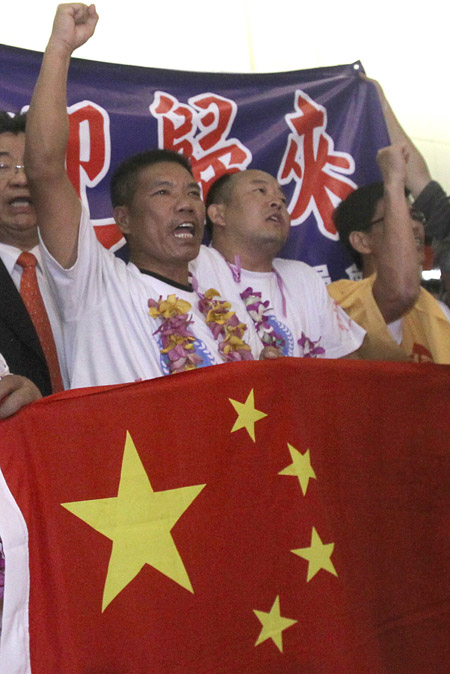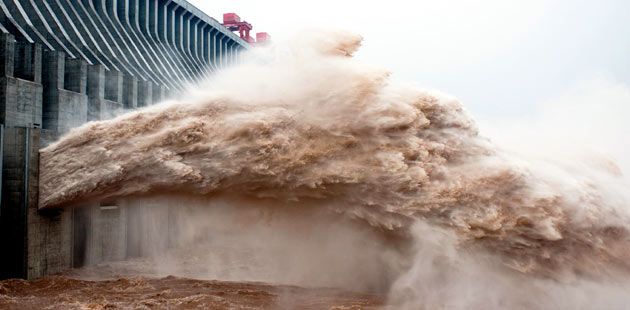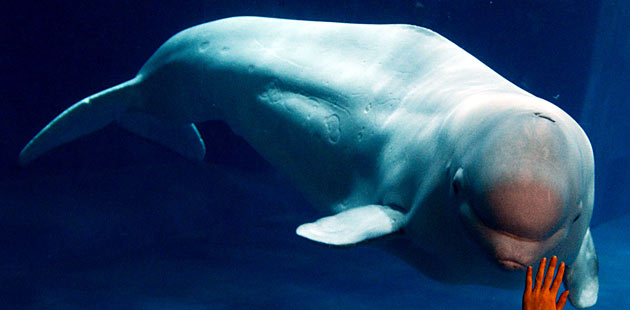Nationals released by Japan police
Updated: 2012-08-18 02:43
By Wang Chenyan in Beijing and Kahon Chan in Hong Kong (China Daily)
|
||||||||
Activists and journalists welcomed upon their arrival in Hong Kong
Seven of the 14 Chinese nationals who were illegally detained by Japanese police when going to the Diaoyu Islands on Wednesday arrived in Hong Kong by plane on Friday.
|
 Activists arrive at Hong Kong airport on Friday.[Edmond Tang / China Daily] |
The seven people boarded a plane taking off from Naha airport in southwest Japan at around 6:40 pm local time.
The other group of seven has also left Okinawa on their boat before midnight on Friday. They boarded a Japan Coast Guard plane earlier to fly to Ishigaki Island, where their vessel was detained.
The 14 Chinese, despite obstruction by Japan Coast Guard patrol ships, arrived at the Diaoyu Islands by a Hong Kong fishing vessel on Wednesday to assert China’s sovereignty over the islands. They were arrested by Japanese police on suspicion of "illegal entry".
The flight that carried the five activists and two journalists landed at the Hong Kong airport before 8 pm on Friday. They walked into a cheering crowd at the arrival hall with the national flag and a large banner that said "warm welcome to the Diaoyu warriors".
Like other activists, Tsang Kin-shing said they only agreed to reclaim their property, but no one had signed the papers to admit illegal entry of "Japanese soil".
"No one signed that paper. We would rather sit there and wait," he said. Despite that, they were eventually released.
Charles Lo Chung-cheon, who made his first trip to the Diaoyu Islands, described details of the clash.
"It was like war and they rammed our boat many times," he said.
He recalled that several vessels of the Japanese maritime guards bumped into their fishing ship one after the other, but they continued to sail forward and responded by throwing stones at the guards, forcing the Japanese vessels to retreat.
As they approached the rocky beach, they effortlessly cleared the final hurdle as the guard’s ship had to get out of the shallow waters.
Lo said he would like return to the islands. "I’m not sure whether I will get a second chance, but I will take it if I get one," Lo said.
Chan Yu-lam, the spokesman for the Action Committee for Defending the Diaoyu Islands, expressed gratitude to the Hong Kong SAR government on ensuring the safe return of the men and boat.
Jiang Xiaofeng, a Phoenix TV reporter, urged the Japanese authorities to return seized footage.
"History cannot be wiped out. Truth cannot be wiped out," he said upon arrival in Hong Kong.
Kai Fung No 2, which carries seven other activists and crew members, left the port of Ishigaki Island before midnight on Friday. The action committee, citing the ship’s captain, said they had to pump water out of the engine room before leaving.
The Japanese cabinet announced on Friday morning that it had decided to release all 14 Chinese nationals.
Japan’s Chief Cabinet Secretary Osamu Fujimura said the government would not pursue further charges against the activists while denying any political consideration.
China’s Foreign Ministry said on Friday that China holds a "firm stance" over the Diaoyu Islands, and any of Japan’s unilateral moves against Chinese nationals is illegal and invalid.
"The Chinese government has repeatedly lodged solemn representations to Japan over the illegal detention," Foreign Ministry spokesman Qin Gang said.
Experts said that thanks to lessons learned before, Japan has been moving quickly to avoid further damage on its ties with its neighboring country.
"Japan could have attacked the activists’ vessel and they could have copied a two-week long standoff in 2010. But it has been forced to calm down by past experience," said Wang Ping, an expert on Japanese studies at the Chinese Academy of Social Sciences.
In 2010, Japan arrested Zhan Qixiong, a Chinese fishing ship captain for entering waters near the Diaoyu Islands. Naoto Kan’s cabinet at that time pursued prosecution, which chilled Sino-Japanese relations.
The incident ended up with Japan sending Zhan back to China and a freeze of high-level exchanges between the two nations.
"The territorial dispute originates from history and is tied to national interest. That is why it is difficult to deal with. But as for the Diaoyu Islands, China is impeccable on both historical and legal bases. So if Japan keeps emphasizing its actual control and domestic law, then China is not afraid of playing tit for tat," Wang said.
Japan’s Prime Minister Yoshihiko Noda called the incident "extremely regrettable".
Yukio Edano, Japan’s Minister of Economy, Trade and Industry, expressed concern that a sovereignty confrontation could "seriously affect" economic activities between Japan and China.
There are voices in Japan calling on the Japanese government to take a tougher position as it has been struggling to cope with island disputes with neighboring countries.
Japan threatened Friday to cancel upcoming ministerial talks and take the island dispute to the International Court of Justice to protest recent remarks and actions by South Korean President Lee Myung-bak.
Lee recently visited disputed islands called Takeshima in Japanese and Dokdo in Korean and asked the Japanese Emperor to apologize to the Korean people for war crimes.
"It is natural for the actual one in control to play hard ball. However, if Japan keeps its stance to refuse dialogue, similar incidents and confrontation will become more frequent and Sino-Japanese ties will be further damaged," said Shen Shishun, an expert on Asia-Pacific studies at Haikou College of Economics in Hainan province.
The arrests of activists have prompted protests in Hong Kong and Beijing, which also made Japanese media express worries and doubts about more "excessive movements".
Shen said there is a great possibility of actions by Chinese nationals to protect the sovereignty of the Diaoyu Islands becoming regular.
"Where the future relations of the two countries is headed is up to Tokyo, whether to keep breaking the status quo or to return to the negotiating table. China does not want to see a future running counter to cooperative ties with Japan," Shen said.
Contact the writers at wangchenyan@chinadaily.com.cn and kahon@chinadailyhk.com











